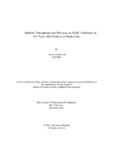Mothers’ perceptions and practices on child’s nutrition of 0-3 years old children in Dhaka city

View/Open
Date
2021-12Publisher
Brac UniversityAuthor
Muntaha, MumtasinMetadata
Show full item recordAbstract
Child malnutrition is still a serious public health problem in developing and underdeveloped countries. It’s one of the major risk factors of mortality among young children. From birth to two years of age, children are extremely sensitive to what and how they are fed. Thus, this study aimed to explore the perceptions and feeding practices of prime caregivers of children that is mothers’; both educated & uneducated mothers' perceptions and practices towards early childhood nutrition in the context of the urban area of Dhaka city was explored in this study. The study is a descriptive qualitative study conducted on 6 mothers (3 mothers from the lower-income background and 3 mothers from the upper-middle-income background) who were selected via purposive sampling technique. Data of this study were collected through both in-depth interviews and focus-group discussions, with a total of 12 mothers’; conducted in both natural home settings and via online zoom meetings. The study followed by two main research questions, which are, mothers’ perceptions of nutrition for children aged 0-3 years – living in the urban area of Dhaka city & the nutritional support (feeding practices), that is provided by the mothers for children aged between 0-3 years in the study area. The study found out the differences of perceptions, behaviors & practices on child’s nutrition of 0-3 years aged children in between lower-income and upper-middle-income group, the disparities in children's nutrition that exist between these two groups. The study also highlighted that child feeding decisions/practices are influenced by ‘time’ and ‘work pressures’ on mothers. The mothers’ have knowledge of how childhood malnutrition could be controlled but their practices on preventing childhood malnutrition, don’t entirely reflect the knowledge.
